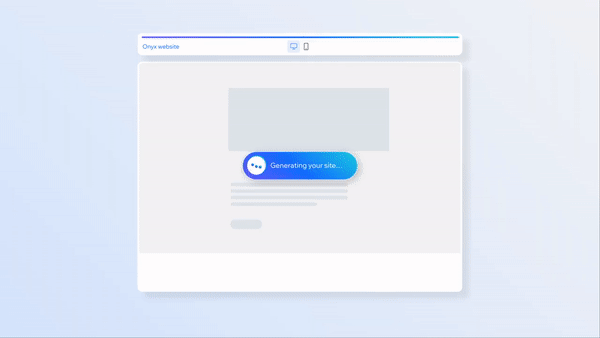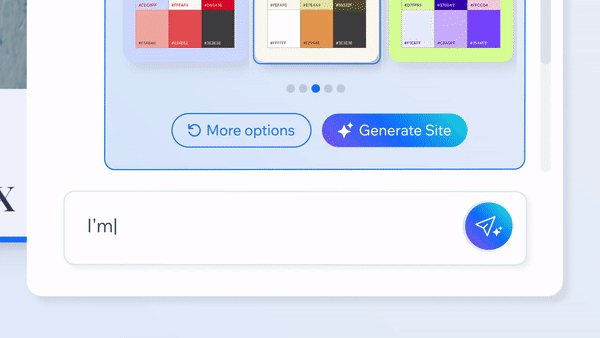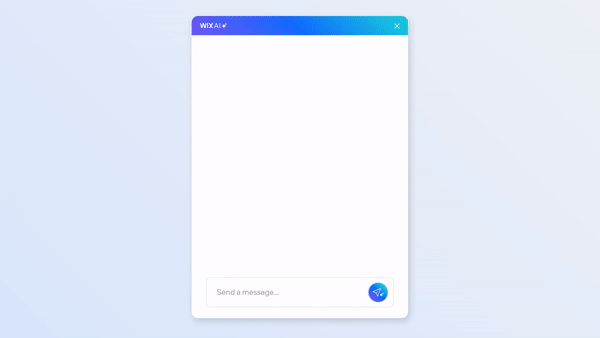Wix’s new tool can create entire websites from prompts
What does one expect from a website builder in 2023? That’s the question many startups — and incumbents — are trying to answer as the landscape changes, driven by trends in generative AI. Do no-code drag-and-drop interfaces still make sense in an era of prompts and media-generating models? And what’s the right level of abstraction that won’t alienate more advanced users?
Wix, a longtime fixture of the web building space, is betting that today’s customers don’t particularly care to spend time customizing every aspect of their site’s appearance.
The company’s new AI Site Generator tool, announced today, will let Wix users describe their intent and generate a website complete with a homepage, inner pages and text and images — as well as business-specific sections for events, bookings and more. Avishai Abrahami, Wix’s co-founder and CEO, says that the goal was to provide customers with “real value” as they build their sites and grow their businesses.
“The AI Site Generator leverages our domain expertise and near-decade of experience with AI to tune the models to generate high-quality content, tailor-made design and layouts,” Abrahami said. “We’ve conducted many tests and have had many in-depth conversations with users to be confident that we are delivering real value. That’s why we chose to do it now.”
Image Credits: Wix
AI Site Generator might be Wix’s most ambitious AI experiment to date, but it’s not the company’s first. Wix’s recently launched text creator taps ChatGPT to give users the ability to generate personalized content for particular sections of a website. Meanwhile, its AI template text creator generates all the text for a given site. There’s also the AI domain generator for brainstorming web domain names, which sits alongside Wix’s suite of AI image editing, fine-tuning and creation tools.
The way Abrahami tells it, Wix isn’t jumping on AI because it’s the Silicon Valley darling of the moment. He sees the tech as a genuine way to streamline and simplify the process of building back-end business functionality, infrastructure, payments capabilities and more for customers’ websites.

Image Credits: Wix
To Abrahami’s point, small businesses in particular struggle to launch and maintain sites, potentially causing them to miss income opportunities. A 2022 survey by Top Design Firms, a directory for finding creative agencies, found that nearly 27% of small businesses still don’t have a website and that low traffic, followed by adding “advanced” functionalities and cost, are the top challenges they face with their website.
AI Site Generator takes several prompts — any descriptions of sites — and uses a combination of in-house and third-party AI systems to create the envisioned site. In a chatbot-like interface, the tool asks a series of questions about the nature of the site and business, attempting to translate this into a custom web template.
ChatGPT generates the text for the website while Wix’s AI creates the site design and images.
Other platforms, like SpeedyBrand, which TechCrunch recently profiled, already accomplish something this. But Wix claims that AI Site Generator is unique in that it can build in e-commerce, scheduling, food ordering and event ticketing components automatically, depending on a customer’s specs and requirements.

Image Credits: Wix
“With AI Site Generator, users will be able to create a complete website, where the design fits the content, as opposed to a template where the content fits the design,” Abrahami said. “This generates a unique website that maximizes the experience relevant to the content.”
Customers aren’t constrained to AI Site Generator’s designs, a not-so-subtle acknowledgement that AI isn’t at the point where it can replace human designers — assuming it ever gets there. The full suite of Wix’s editing tools — both manual and AI-driven — is available to AI Site Generator users, letting them make tweaks and changes as they see fit.
New capabilities focused on editing will arrive alongside AI Site Generator, too, like an AI page and section creator that’ll enable customers to add a new page or section to a site simply by describing their needs. The forthcoming object eraser will let users extract objects from images and manipulate them, while the new AI assistant tool will suggest site improvements (e.g. adding a product or changing a design) and create personalized strategies based on analytics and site trends.

Image Credits: Wix
“The current AI revolution is just beginning to unleash AI’s true potential,” Abrahami said. “We believe AI can reduce complexity and create value for our users, and we will continue to be trailblazers.”
But there’s reason to be wary of the tech.
As The Verge’s James Vincent wrote in a recent piece, generative AI models are changing the economy of the web — making it cheaper and easier to generate lower-quality content. Newsguard, a company that provides tools for vetting news sources, has exposed hundreds of ad-supported sites with generic-sounding names featuring misinformation created with generative AI.
Cheap AI content also risks clogging up search engines — a future small businesses almost certainly don’t want. Models such as ChatGPT excel at crafting search engine-friendly marketing copy. But this spam can often bury legitimate sites, particularly sites created by those without the means or know-how to optimize their content with the right keywords and schema.
Even generative AI used with the best intentions can go awry. Thanks to a phenomenon known as “hallucination,” AI models sometimes confidently make up facts or spew toxic, wildly offensive remarks. And generative AI has been shown to plagiarize copyrighted work.
So what steps is Wix taking to combat all this? Abrahami didn’t say specifically. But he stressed that Wix uses a “bevy” of tools to manage spam and abuse.
“Our AI solutions are tried and tested on large-scale quality data and we leverage the knowledge gained from usage and building workflows across hundreds of millions of websites,” Abrahami said. “We have many models, including AI, that prevent and detect model abuse because we believe in creating a safe digital space where the fundamental rights of users are protected. ChatGPT has an inherent model to prevent inappropriate content generation; we plan to use OpenAI’s moderation.”
Time will tell how successful that strategy ends up being.





